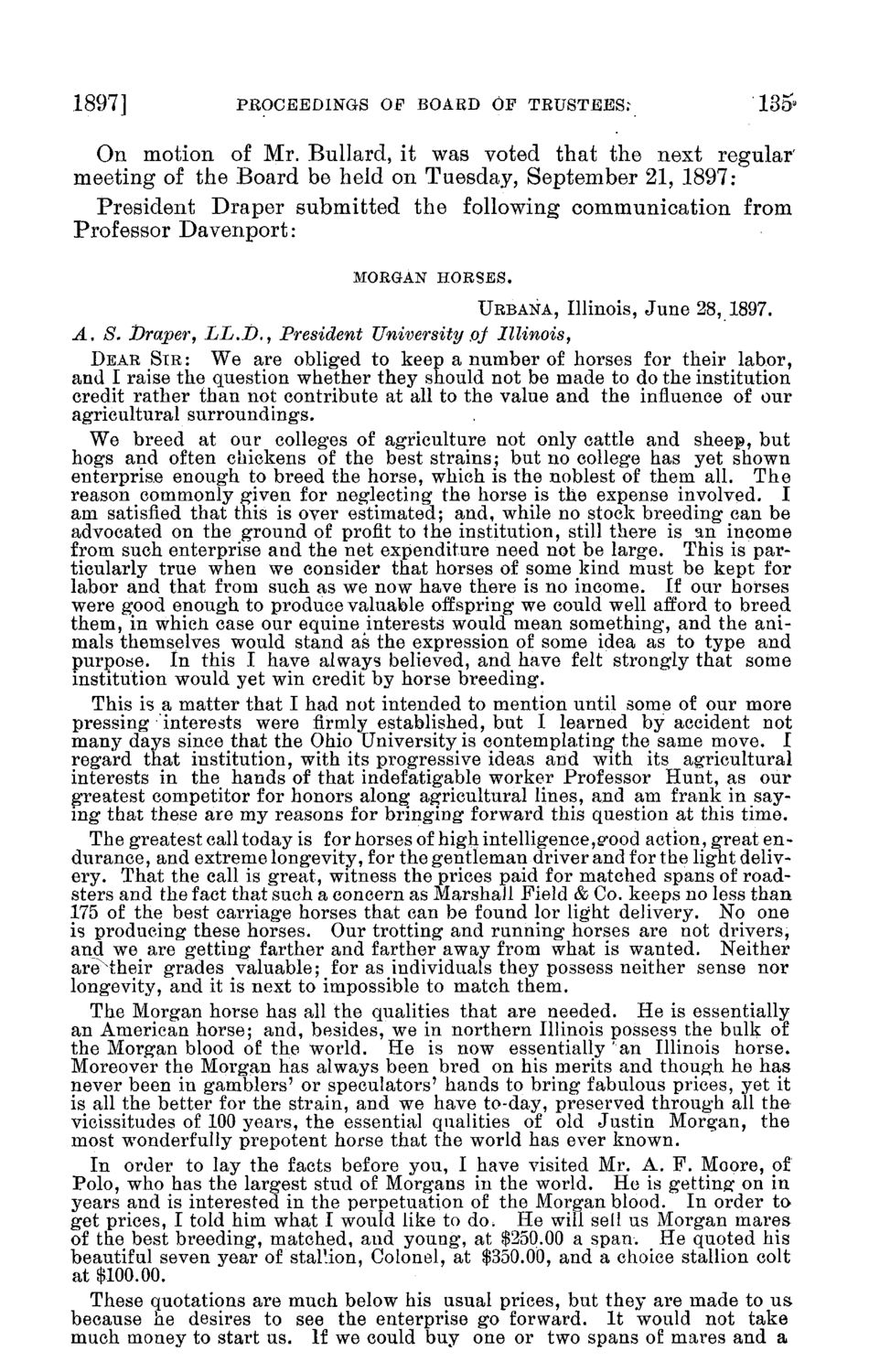| |
| |
Caption: Board of Trustees Minutes - 1898
This is a reduced-resolution page image for fast online browsing.

EXTRACTED TEXT FROM PAGE:
1897] PROCEEDINGS OF BOARD OF TRUSTEES: 1353 O n motion of Mr. Bullard, it was voted t h a t t h e n e x t regular' m e e t i n g of t h e B o a r d be held on T u e s d a y , S e p t e m b e r 21, 1897: P r e s i d e n t D r a p e r s u b m i t t e d t h e following c o m m u n i c a t i o n from Professor D a v e n p o r t : MORGAN HORSES. URBANA, Illinois, June 28, 1897. A. S. Draper, LL.JD., President University of Illinois, DEAR S I R : We are obliged to keep a number of horses for their labor, and I raise the question whether they should not be made to do the institution credit rather than not contribute at all to the value and the influence of our agricultural surroundings. We breed at our colleges of agriculture not only cattle and sheep, but hogs and often chickens of the best strains; but no college has yet shown enterprise enough to breed the horse, which is the noblest of them all. The reason commonly given for neglecting the horse is the expense involved. I am satisfied that this is over estimated; and, while no stock breeding can be advocated on the ground of profit to the institution, still there is an income from such enterprise and the net expenditure need not be large. This is particularly true when we consider that horses of some kind must be kept for labor and that from such as we now have there is no income. If our horses were good enough to produce valuable offspring we could well afford to breed them, in which case our equine interests would mean something, and the animals themselves would stand as the expression of some idea as to type and purpose. In this I have always believed, and have felt strongly that some institution would yet win credit by horse breeding. This is a matter that I had not intended to mention until some of our more pressing interests were firmly established, but I learned by accident not many days since that the Ohio University is contemplating the same move. I regard that institution, with its progressive ideas and with its agricultural interests in the hands of that indefatigable worker Professor Hunt, as our greatest competitor for honors along agricultural lines, and am frank in saying that these are my reasons for bringing forward this question at this time. The greatest call today is for horses of high intelligence,e*ood action, great endurance, and extreme longevity, for the gentleman driver and for the light delivery. That the call is great, witness the prices paid for matched spans of roadsters and the fact that such a concern as Marshall Field & Co. keeps no less than 175 of the best carriage horses that can be found lor light delivery. No one is producing these horses. Our trotting and running horses are not drivers, and we are getting farther and farther away from what is wanted. Neither are^their grades valuable; for as individuals they possess neither sense nor longevity, and it is next to impossible to match them. The Morgan horse has all the qualities that are needed. He is essentially an American horse; and, besides, we in northern Illinois possess the bulk of the Morgan blood of the world. He is now essentially 'an Illinois horse. Moreover the Morgan has always been bred on his merits and though he has never been in gamblers' or speculators' hands to bring fabulous prices, yet it is all the better for the strain, and we have to-day, preserved through all the vicissitudes of 100 years, the essential qualities of old Justin Morgan, the most wonderfully prepotent horse that the world has ever known. In order to lay the facts before you, I have visited Mr. A. F. Moore, of Polo, who has the largest stud of Morgans in the world. He is getting on in years and is interested in the perpetuation of the Morgan blood. In order to get prices, I told him what I would like to do. He will sell us Morgan mares of the best breeding, matched, and young, at $250.00 a span. He quoted his beautiful seven year of stallion, Colonel, at $350.00, and a choice stallion colt at $100.00. These quotations are much below his usual prices, but they are made to us because he desires to see the enterprise go forward. It would not take much money to start us. If we could buy one or two spans of mares and a
| |